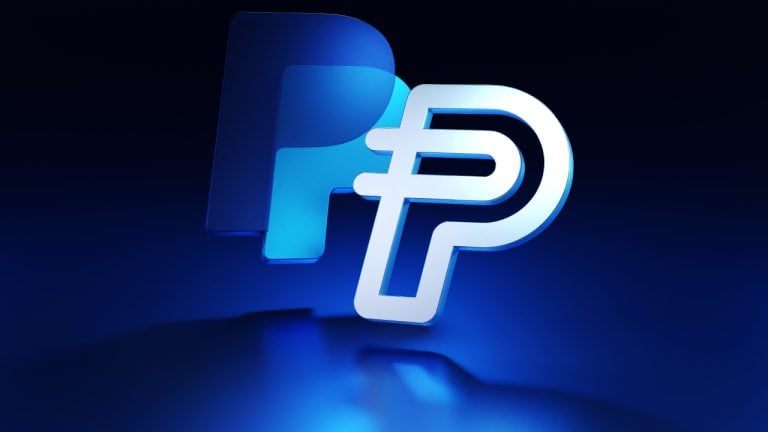 Paypal, in collaboration with Energy Web and DMG Blockchain Solutions Inc., has introduced an approach to promote environmentally sustainable practices in bitcoin mining. This research-backed initiative encourages miners to utilize low-carbon energy sources by offering financial incentives. Paypal Blockchain Research Team Advocates for Low-Carbon Mining With Financial Incentives The rise of the Bitcoin network has […]
Paypal, in collaboration with Energy Web and DMG Blockchain Solutions Inc., has introduced an approach to promote environmentally sustainable practices in bitcoin mining. This research-backed initiative encourages miners to utilize low-carbon energy sources by offering financial incentives. Paypal Blockchain Research Team Advocates for Low-Carbon Mining With Financial Incentives The rise of the Bitcoin network has […]

PayPal’s Blockchain Research Group wants to designate “green miners” and reward them accordingly with additional Bitcoin.
International payments giant PayPal has proposed to make sustainable Bitcoin (BTC) mining more economically attractive by rewarding miners through incentives layered on top of the Bitcoin network.
PayPal’s Blockchain Research Group, in collaboration with Energy Web and DMG Blockchain Solutions, has proposed using “cryptoeconomic incentives” to encourage Bitcoin miners to use low-carbon energy sources, according to an April 22 blog post.
The firm hopes that the experimental incentive contributes to further discussion and innovation around Bitcoin and is seeking industry feedback on potential improvements.
Triple-A, Singapore's licensed payment firm, will offer PayPal's PYUSD stablecoin in June, aiming to enhance its digital token services.
The post PayPal stablecoin PYUSD soon available on Triple-A appeared first on Crypto Briefing.
PayPal's policy update, effective May 20, 2024, will remove NFT transactions from its purchase protection.
The post PayPal withdraws user protection for NFT transactions appeared first on Crypto Briefing.

PayPal just rolled out a new service that allows users to fund their cross-border money transfers using PayPalUSD (PYUSD), the US dollar-pegged stablecoin that the online payments giant unveiled in August last year. In a new statement, PayPal says that US users of remittance provider Xoom can now convert the PYUSD in their PayPal account […]
The post Online Payments Giant PayPal Enables Cross-Border, Stablecoin-Funded Money Transfers for US Customers appeared first on The Daily Hodl.
 On Thursday, Paypal disclosed that users of Xoom now have the capability to utilize the company’s stablecoin PYUSD for conducting international cross-border transactions. Beginning on April 4, this feature was made accessible to users in the U.S., enabling them to transfer PYUSD to beneficiaries across roughly 160 countries worldwide. Paypal’s Xoom Adds PYUSD Cross-Border Transfers […]
On Thursday, Paypal disclosed that users of Xoom now have the capability to utilize the company’s stablecoin PYUSD for conducting international cross-border transactions. Beginning on April 4, this feature was made accessible to users in the U.S., enabling them to transfer PYUSD to beneficiaries across roughly 160 countries worldwide. Paypal’s Xoom Adds PYUSD Cross-Border Transfers […] In the last day, the global trading volume has hit $203 billion, with stablecoins accounting for an impressive $133 billion of that total. Among the array of stablecoin assets tied to the U.S. dollar, Paypal’s PYUSD has emerged as a top ten player. Yet, despite the ongoing cryptocurrency market upswing, PYUSD has shown minimal activity […]
In the last day, the global trading volume has hit $203 billion, with stablecoins accounting for an impressive $133 billion of that total. Among the array of stablecoin assets tied to the U.S. dollar, Paypal’s PYUSD has emerged as a top ten player. Yet, despite the ongoing cryptocurrency market upswing, PYUSD has shown minimal activity […]

Earlier this year, PayPal released its own stablecoin. What effect has it had on crypto adoption?
PayPal’s introduction of its native stablecoin, PayPal USD (PYUSD), has sparked heated debates within the crypto industry regarding its possible sway on payments and wider crypto adoption.
While this step seems to be a big jump toward accepting cryptocurrencies in regular finance, some industry observers advise caution.
This initiative aims to bridge the fiat and digital currency realms for consumers, merchants and developers. PayPal CEO Dan Schulman highlighted the need for a stable digital-fiat conduit.
“The shift toward digital currencies requires a stable instrument that is both digitally native and easily connected to fiat currency like the U.S. Our commitment to responsible innovation and compliance, and our track record delivering new experiences to our customers, provides the foundation necessary to contribute to the growth of digital payments through PayPal USD.”

Apple is facing the wrath of crypto users yet again as a popular Bitcoin Lightning wallet disappeared from its U.S.-facing App Store.
Bitcoin (BTC) Lightning payments app Wallet of Satoshi (WoS) has disappeared from Apple’s App Store and Google’s Play Store in the United States as it closes in on over 1 million transactions for November.
On Nov. 24, several users and crypto community participants shared on X (Twitter) their attempts to search for the WoS app, which turned up no results or redirected users to competing wallet apps.
Wallet of Satoshi banned in the US? pic.twitter.com/S44qN5UI2U
— ck (@ck_SNARKs) November 23, 2023
However, the WoS app still appeared for download on the Australian Apple App Store and the Australian and Singapore Google Play Store versions at the time of writing.

Wallet of Satoshi is a popular Lightning payments platform that is on pace to process over 1.1 million Lightning payments in November, according to industry author and podcaster Kevin Rooke.
Wallet of Satoshi is on pace to process over 1.1 million Lightning payments in November.
— Kevin Rooke (@kerooke) November 22, 2023
This will be their largest month of Lightning payments ever.
⚡️ pic.twitter.com/oCxIce7kit
Rooke added that it would be the firm’s “largest month of Lightning payments ever.”
Apple and Wallet of Satoshi did not immediately respond to a request for more details.
Related: Demand for Bitcoin could grow by up to 10x within 12 months: Michael Saylor
Apple levies a hefty 30% tax on in-app payments, which it maintains a tight leash over and has been a barrier for crypto platforms wanting an App Store presence.
On Nov. 17, a group of disgruntled PayPal Venmo and Block Cash App users filed a class-action lawsuit against Apple, claiming the company had entered into anti-competitive agreements with PayPal and Block to restrict the use of crypto technology and payments on iOS.
Apple has a history of removing crypto apps, with the firm delisting the Nostr-based Damus app over a Bitcoin tip feature in June. It also briefly pulled the MetaMask wallet app from its App Store in October.
Magazine: Blockchain detectives — Mt. Gox collapse saw birth of Chainalysis